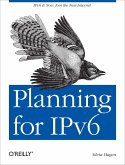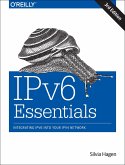IPv6 Advanced Protocols Implementation is the second installment of a two-volume series on IPv6 and the KAME implementation. This book discusses those protocols that are found in more capable IPv6 devices, are commonly deployed in more complex IPv6 network environments, or are not specific to IPv6 but are extended to support IPv6. Specifically, this book engages the readers in advanced topics such as routing, multicasting, DNS, DHCPv6, mobility, and security.
This two-volume series covers a wide spectrum of the IPv6 technology, help the readers establish solid and empirical understanding on IPv6 and the KAME reference implementation paralleled by none.
Key Features:
Extensive code listings with meticulous line-by-line explanation of rationale and use for KAME snapshot implementations on advanced IPv6 related protocols, including: Unicast and multicast routing and DNS client based on KAME snapshot dated April 2003, which are a base of more recent versionsof BSD variants Mobile IPv6 based on KAME snapshot dated July 2004, a predecessor version of the "SHISA" implementation DHCPv6 based on KAME snapshot dated May 2005, a base of the WIDE-DHCPv6 implementation available at SourceForge today Numerous diagrams and illustrations help in visualizing the implementation In-depth discussion of the standards provides intrinsic understanding of the specifications An introduction to the IP security protocols along with the use of the racoon key exchange daemon Two CD-ROMs filled with the complete KAME IPv6 protocol stack and FreeBSD software
The only authoritative reference "cookbook" for anyone interested in advanced IPv6 topics and protocols Line-by-line walk through of real code helps the reader master IPv6 implementation Comprehensive in scope, based on a working standard, and thoroughly illustrated to bring the protocols alive
This two-volume series covers a wide spectrum of the IPv6 technology, help the readers establish solid and empirical understanding on IPv6 and the KAME reference implementation paralleled by none.
Key Features:
Extensive code listings with meticulous line-by-line explanation of rationale and use for KAME snapshot implementations on advanced IPv6 related protocols, including: Unicast and multicast routing and DNS client based on KAME snapshot dated April 2003, which are a base of more recent versionsof BSD variants Mobile IPv6 based on KAME snapshot dated July 2004, a predecessor version of the "SHISA" implementation DHCPv6 based on KAME snapshot dated May 2005, a base of the WIDE-DHCPv6 implementation available at SourceForge today Numerous diagrams and illustrations help in visualizing the implementation In-depth discussion of the standards provides intrinsic understanding of the specifications An introduction to the IP security protocols along with the use of the racoon key exchange daemon Two CD-ROMs filled with the complete KAME IPv6 protocol stack and FreeBSD software
The only authoritative reference "cookbook" for anyone interested in advanced IPv6 topics and protocols Line-by-line walk through of real code helps the reader master IPv6 implementation Comprehensive in scope, based on a working standard, and thoroughly illustrated to bring the protocols alive
"I would purchase the books... since I am Ipv6 connected it would be a nice reference... I do think that if you buy one you will buy the other, assuming that the chapters are setup correctly." --Randall Stewart, Cisco Systems
"My immediate reaction was that I thought it would be better in one volume, BUT then I saw the level of detail that he is intending to include, and the subsequent size of the work. Now, I agree entirely with the author that it should be split into 2 volumes as he suggests... This will be a real reference manual for IPv6... I think that the sort of people who buy Volume I will also buy Volume II. They are closely linked, and in order to have the complete guide to IPv6, you need both." --Martin Potts, Martel Consulting
"I think the two-volume approach is suitable. I recommend this publication and I would like to buy both volumes when these are achieved." --Jun Murai, KEIO University
"IPv6 Advanced Protocols Implementations provides the advanced next level core networking functions, applications, and technology that extends the use of IPv6 to support Routing, Multicasting, Domain Name System, Dynamic Host Configuration Protocol, Mobile IPv6, and Security. The authors identify each of the aforementioned technology components and provide an in-depth analysis, operational, and implementation view of these functions and applications. The authors also provide the differences at key points in the discussions with the current Internet Model and the advantages of IPv6. These are very hard technology components to present with clarity and the authors did that and in a concise manner. This book would be of value to architects, programmers, operators, and technologists that will deploy IPv6 and a good companion book to the authors IPv6 Core Protocols Implementation book." --Jim Bound, CTO IPv6 Forum www.ipv6forum.com
"My immediate reaction was that I thought it would be better in one volume, BUT then I saw the level of detail that he is intending to include, and the subsequent size of the work. Now, I agree entirely with the author that it should be split into 2 volumes as he suggests... This will be a real reference manual for IPv6... I think that the sort of people who buy Volume I will also buy Volume II. They are closely linked, and in order to have the complete guide to IPv6, you need both." --Martin Potts, Martel Consulting
"I think the two-volume approach is suitable. I recommend this publication and I would like to buy both volumes when these are achieved." --Jun Murai, KEIO University
"IPv6 Advanced Protocols Implementations provides the advanced next level core networking functions, applications, and technology that extends the use of IPv6 to support Routing, Multicasting, Domain Name System, Dynamic Host Configuration Protocol, Mobile IPv6, and Security. The authors identify each of the aforementioned technology components and provide an in-depth analysis, operational, and implementation view of these functions and applications. The authors also provide the differences at key points in the discussions with the current Internet Model and the advantages of IPv6. These are very hard technology components to present with clarity and the authors did that and in a concise manner. This book would be of value to architects, programmers, operators, and technologists that will deploy IPv6 and a good companion book to the authors IPv6 Core Protocols Implementation book." --Jim Bound, CTO IPv6 Forum www.ipv6forum.com








